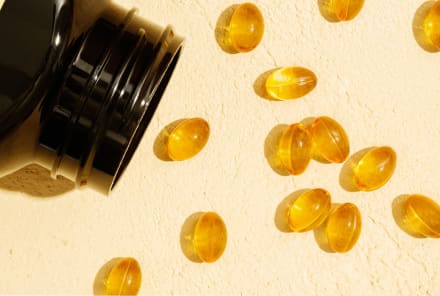Advertisement
Rescue Your Digestion & Prevent A Hangover With This Super-Versatile Supplement


What’s abrasive, gritty, and absolutely belongs in your medicine cabinet (but probably isn’t)? I’m talking about activated charcoal, which manufacturers create by reheating and oxidizing regular charcoal (yep, the same stuff you barbecue with in the summer), giving it a rough surface area.
Activated charcoal’s extremely porous surface holds a strong negative charge that attracts positively charged toxins and other chemicals, nixing them in your bowel movements. Think of activated charcoal as a magnet that binds unwanted substances to its surface and then releases1 them through elimination, yet its unique makeup doesn’t irritate or harm your gut.
This workhorse supplement can help your body detoxify, but it can also benefit other problems like burns, heavy metal poisoning, and drug overdoses. Far from being the latest fad, activated charcoal has been used for centuries; ancient Egyptians used it to treat intestinal issues, and Hippocrates used it to treat serious illness like epilepsy. Beginning in the 1960s, hospitals used activated charcoal to remedy alcohol and drug overdoses.
Today, activated charcoal can be a serious help if you get food poisoning, suffer toxic overload, or take too many over-the-counter remedies. On those rare occasions when you imbibe more than you wish or have a mild food sensitivity, activated charcoal can be a lifesaver. To get its benefits, take activated charcoal about an hour after the problem originates, before the ingested substance can do any damage.
A few emphatic caveats here: Don’t use activated charcoal as an excuse to drink too much, take recreational drugs, or avoid the hospital if you have true food poisoning. This is a supplement, not a magic pill. If you’re suffering from food poisoning, an overdose, or gastrointestinal pain, contact your health care professional or visit an emergency room. Now that that's out of the way, here are seven way to make activated charcoal part of your health care regimen:
1. Skin health.
Bacteria, dirt, unwanted oil, or excess sebum can block your skin’s surface, creating or exacerbating acne and other skin problems. Charcoal soap (comprised of gritty, black activated charcoal) penetrates deep below your skin’s surface to pull out toxins and remove stagnant waste for creating glowing, vibrant skin. While many health food stores sell charcoal soap, you can also mix a tablespoon or two of activated charcoal (I break open capsules) into a thick paste with water and spread it along your skin’s surface to remove impurities and increase circulation. Just a warning: Breaking open capsules can get messy, so proceed with caution!
2. Dental hygiene.
Another potentially messy scenario: Activated charcoal can clean, whiten, and detoxify your teeth. Activated charcoal binds impurities and pulls stains, toxins, and unwanted bacteria from your mouth. You’ll have whiter teeth, zap infections, improve oral health, and your dentist will probably be happy too. Just rub it directly on your teeth and gums, you’re OK if you swallow a little bit.
3. Digestive cleansing.
Activated charcoal can cleanse your intestines, kidney, and liver while relieving gut issues. One study found that activated charcoal could significantly reduce bloating and abdominal cramps. For best results, don’t eat two hours before or one hour after taking activated charcoal. Otherwise, you might not optimally absorb nutrients or prescription drugs.
4. Water filtration.
The Environmental Working Group (EWG) recently found highly fluorinated toxic chemicals (PFASs)—which have been linked to cancer, thyroid disease, weakened immunity, and other health problems—in tap water that affects 15 million Americans in 27 states. This is just one of the many, many reasons you want to drink only filtered water. Activated charcoal can help purify your drinking water: It binds solvents, pesticides, waste, harmful toxins, and some fluoride. Many water filtration systems, in fact, utilize activated charcoal.
5. Mold removal.
Wheezing, rashes, coughing, and watery or puffy eyes can all result from mold exposure, which grows in damp, water-damaged homes or environments with little ventilation. Mold can be the leading cause of many serious, untreated illnesses including epilepsy, depression, decreased brain function, as well as kidney and liver failure. Activated charcoal can trap and eliminate mold in your body, relieving these symptoms and reducing your risk for illness.
6. Detoxification support.
While I recommend working with a health care professional who specializes in professional detoxification plans, activated charcoal can help your body gently detoxify daily. You can use capsules, soap, or powder daily to eliminate toxins.
7. Hangover prevention.
If happy hour went a little later than you thought, activated charcoal capsules can help relieve toxic side effects of drinking too much. That doesn’t give you permission to overindulge, but you might thank me the following morning if you've accidentally overdone it.
You’ll find activated charcoal in capsule, powders, soaps, and gel form. To heal external wounds, detoxify your skin, or optimize oral health, gels, powders, and soaps are your best bet. If you’re taking capsules, make sure to drink sufficient water with them. Quality matters here. Look for an activated charcoal from natural sources like coconut.
Ever heard of evening primrose oil? It's also a great supplement to keep in your medicine cabinet.
Watch Next
Enjoy some of our favorite clips from classes
Enjoy some of our favorite clips from classes
What Is Meditation?
Mindfulness/Spirituality | Light Watkins
Box Breathing
Mindfulness/Spirituality | Gwen Dittmar
What Breathwork Can Address
Mindfulness/Spirituality | Gwen Dittmar
The 8 Limbs of Yoga - What is Asana?
Yoga | Caley Alyssa
Two Standing Postures to Open Up Tight Hips
Yoga | Caley Alyssa
How Plants Can Optimize Athletic Performance
Nutrition | Rich Roll
What to Eat Before a Workout
Nutrition | Rich Roll
How Ayurveda Helps Us Navigate Modern Life
Nutrition | Sahara Rose
Messages About Love & Relationships
Love & Relationships | Esther Perel
Love Languages
Love & Relationships | Esther Perel

















